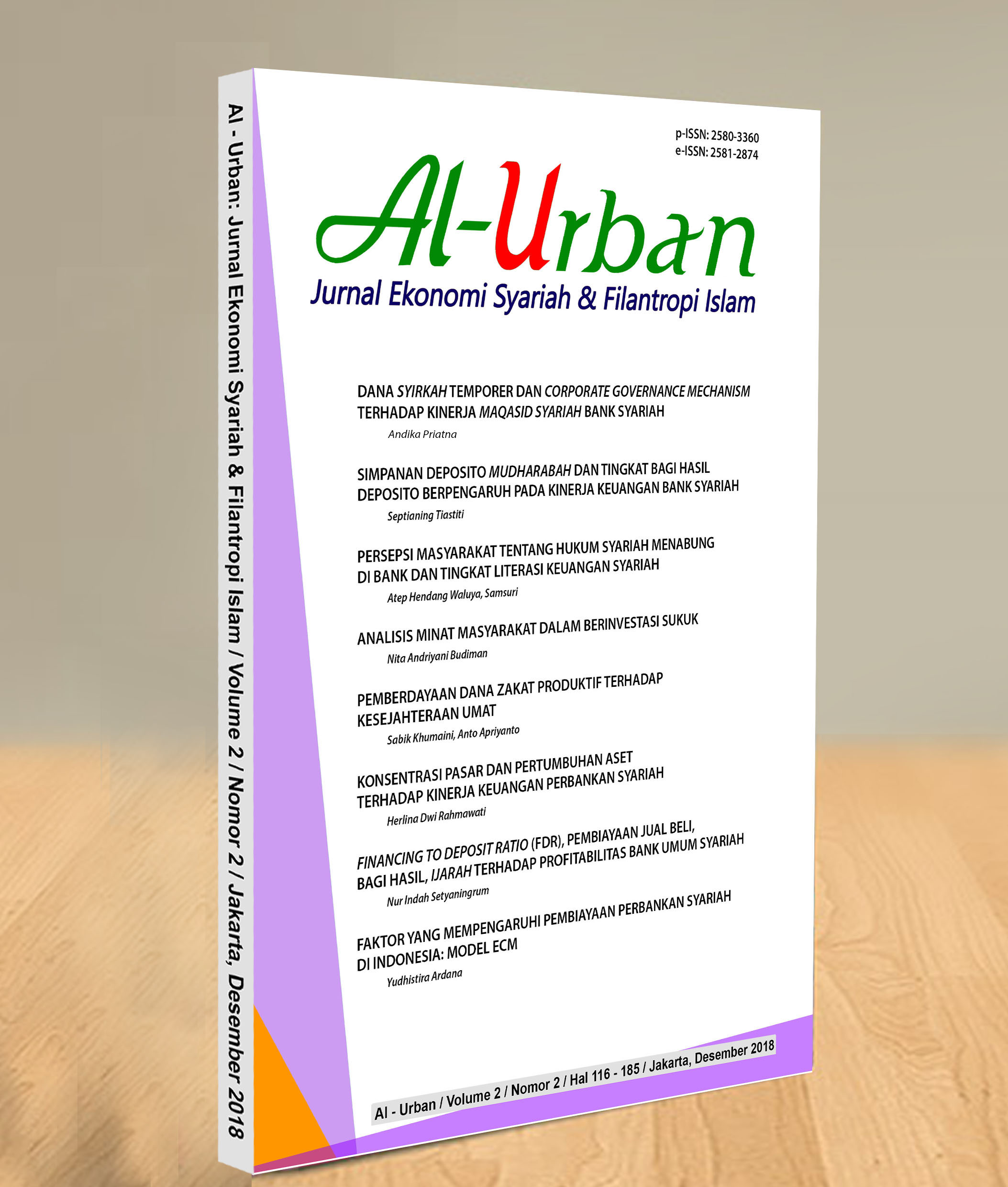Perbandingan Kepatuhan Terhadap Prinsip Syariah dalam Pembiayaan Bank Syariah
DOI:
https://doi.org/10.22236/alurban_vol8.i1/17417Keywords:
Shariah compliance, Islamic banking, Riba, Gharar, MaysirAbstract
This study examines the compliance of Islamic banks with Shariah principles, specifically riba, gharar, and maysir, in financing practices through a literature review. Analysis of eight previous studies explores the effectiveness of implementation and the challenges encountered. The findings indicate that despite significant efforts through Shariah-compliant product designs such as murabahah and istisna', challenges persist, particularly in resembling conventional interest practices, contract complexity, and speculative risks. Factors such as the role of Shariah supervisory boards, regulations, and consumer awareness are pivotal in improving compliance. This study highlights the importance of continuous innovation and rigorous oversight to achieve better adherence to Shariah principles. However, this research is limited by the lack of empirical data and specific geographic coverage, opening avenues for further studies.
Downloads
References
Booth, A., Sutton, A., & Papaioannou, D. (2016). Systematic approaches to a successful literature review (2nd ed.). London: SAGE Publications.
Braun, V., & Clarke, V. (2006). Using thematic analysis in psychology. Qualitative Research in Psychology, 3(2), 77–101. https://doi.org/10.1191/1478088706qp063oa
Gait, A., & Worthington, A. (2008). An empirical survey of individual consumer, business firm, and financial institution attitudes towards Islamic methods of finance. International Journal of Social Economics, 35(11), 783–808.
https://doi.org/10.1108/03068290810905423
Gohar, B. (1999). Islamic finance: Alternatives to the western model. Fletcher World Affairs.
Hammond, H., & Haider, A. (2007). Jurisprudential schizophrenia: On form and function in Islamic finance. Chicago Journal of International Law, 1(2), 1–22.
Haron, S., Ahmad, N., & Planisek, S. (2002). Bank patronage factors of Muslim and non-Muslim customers. International Journal of Bank Marketing, 12(1), 32–40. https://doi.org/10.1108/02652329210016072
Hawse, A. (2008). Back to basics: Islamic financing. Global Finance, 31(1), 30–34.
Khattak, N., & Ur-Rehman, K. (2010). Customer satisfaction and awareness of Islamic banking system. African Journal of Business Management, 4(5), 662–671.
Lockwood, C., Munn, Z., & Porritt, K. (2015). Qualitative research synthesis: Methodological guidance for systematic reviewers utilizing meta-aggregation. International Journal of Evidence-Based Healthcare, 13(3), 179–187.
https://doi.org/10.1097/XEB.0000000000000062
Maswadeh, S. (2014). A compliance of Islamic banks with the principles of Islamic finance (Shariah): An empirical survey of business firms. International Journal of Accounting and Financial Reporting, 4(1), 169–196. https://doi.org/10.5296/ijafr.v4i1.5448
Okoli, C. (2015). A guide to conducting a standalone systematic literature review. Communications of the Association for Information Systems, 37(1), 879–910.
Okumus, H. (2005). Interest-free banking in Turkey: A study of customer satisfaction and bank selection criteria. Journal of Economic Cooperation, 26(4), 51–86.
Othman, A., & Owen, L. (2001). The multidimensionality of CARTER model to measure customer service quality in Islamic banking industry. International Journal of Islamic Financial Services, 3(4), 1–12.
Patton, M. Q. (1999). Enhancing the quality and credibility of qualitative analysis. Health Services Research, 34(5 Pt 2), 1189–1208.
Ramdhani, M. A., Ramdhani, A., Kurniati, & Mariam, D. (2011). The influence of service quality toward customer satisfaction of Islamic Sharia bank. Journal of Basic and Applied Sciences, 5(9), 452–461.
Saldana, J. (2021). The coding manual for qualitative researchers (4th ed.). London: SAGE Publications.
Snyder, H. (2019). Literature review as a research methodology: An overview and guidelines. Journal of Business Research, 104, 333–339.
https://doi.org/10.1016/j.jbusres.2019.07.039
Tranfield, D., Denyer, D., & Smart, P. (2003). Towards a methodology for developing evidence-informed management knowledge by means of systematic review. British Journal of Management, 14(3), 207–222. https://doi.org/10.1111/1467-8551.00375
Downloads
Published
How to Cite
Issue
Section
License
Copyright (c) 2024 Al-Urban: Jurnal Ekonomi Syariah dan Filantropi Islam

This work is licensed under a Creative Commons Attribution 4.0 International License.
The Author submiting a manuscript do so on the understanding thet if accepted for publication, copyright of the article shall be assigned to Al-Urban: Jurnal Ekonomi Syariah dan Filantropi Islam, Faculty of Economics and Business, University of Muhammadiyah Prof. DR. HAMKA.
Copyright encompasses exclusive right to reproduse and deliver the article in all form and media, including reprint, photographs, microfilms and any other similar reproductions, as well as transalations. The reproduction of any part of this journal., its storage in database and its transmission by any form or media such as electronic, electrostatic and mechanical copies, photocopies, recordings, magnetic media, etc..will be









